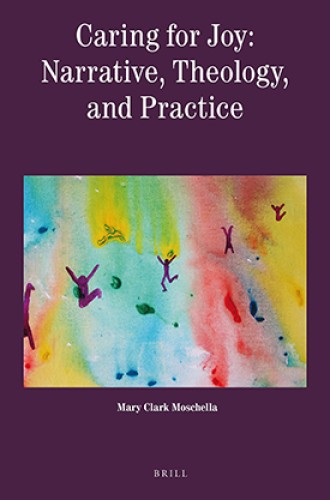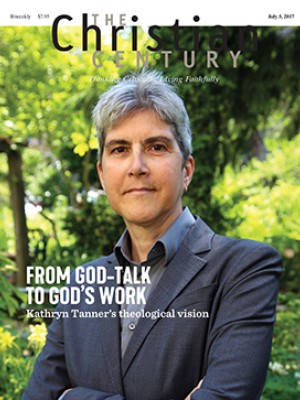Finding joy while fighting injustice
To Mary Clark Moschella, joy is a countercultural phenomenon.
“Got joy?” might be a way to paraphrase the theme of this book by Mary Clark Moschella, who teaches pastoral care at Yale Divinity School. It’s an important question. More than one skeptic has wondered why God’s redeemed often look so dour.
Moschella notes that the subject of joy is “conspicuously missing” in many mainline churches, seminaries, and divinity schools. This absence is partly rooted in appropriate sensitivity to suffering and injustice: “In situations of great suffering, no one wants to encounter the ‘cheerful Christian’ saying, ‘Have a good day!’” As a preacher, I often found myself struggling with this dilemma at Christmas. Just when we’re ready to proclaim joy to the world, an airplane is blown out of the sky, leaving hundreds of families shocked and bereft. Or a terrible auto accident two days before Christmas gut punches a community and haunts its carols of joy.
Read our latest issue or browse back issues.
But joy is so central to our scriptures and to the life of faith that Moschella is not willing to relinquish its importance and promise. She argues for reclaiming the centrality of joy in the life of faith, understanding it as “a counter-cultural emotion and a spiritual path that can strengthen our resolve to transform unjust social arrangements.” She cites Wendell Berry’s counsel, “Be joyful, though you have considered all the facts.”
To build her case, Moschella profiles five Christians whose lives witness to joy even as they confront suffering and injustice: Lutheran pastor Heidi Neumark, monk and writer Henri Nouwen, priest and founder of Homeboy Industries Gregory Boyle, lawyer and civil rights activist Pauli Murray, and physician and creator of Partners in Health Paul Farmer. Moschella shows how each of these Christians know and care for joy even as they experience suffering and engage injustice.
But they do so in various ways. Moschella highlights Neumark’s gift for stepping into new relationships in the South Bronx and leading her congregation in doing the same. With Nouwen, Moschella traces the persistent spiritual darkness and joyous light that walked hand in hand throughout his life until he found a kind of resolution as a member of the L’Arche community.
Boyle, a Jesuit priest known as “G” on the streets in Los Angeles, had to experience his own conversion to understand that “God loves and delights in human beings”—including him—before he could bring such grace to the often traumatized and shame-burdened lives of gang members. “Boyle understands the delighted love of God not as something to be earned, but as something to be discovered.”
An African American woman born in 1910, Murray fought injustice on multiple fronts and never shrank from the battle. Moschella shows how it was Murray’s very participation in struggles for racial equality and women’s rights that brought her a lifelong “sense of exhilaration and well-being.”
While Partners in Health operates on a different scale—a global one—there is a core to Farmer’s work that takes us back to Moschella’s beginning with Neumark—relationships as a matrix of joy. Medicine, as Farmer sees it, is not about “a short-term, one-way encounter, but about establishing lasting friendships and long-term medical services that honor the dignity and rights of people.” (One might wonder: Is this a crucial missing element in much-debated health care in the United States?)
Moschella’s portraits of these five Christians are powerful and suggestive, but still, one might wonder whether her exemplars are the exceptions rather than the rule. Each one is an extraordinary person, fully engaged in the work of healing and justice in the most challenging of circumstances. But what about more ordinary people? What about congregations and communities that are not so self-evidently at the crossroads of struggles for justice?
Or to return to questions posed earlier, why is joy conspicuously missing in many mainline congregations, in the culture of the institutions that prepare mainline leaders, and in the daily lives of many Christians? Is it our “sensitivity to suffering,” our desire to avoid superficial nostrums like “look on the bright side,” or something deeper?
My hunch is there is a deeper issue, one that isn’t easy to name but is quite common. Perhaps we harbor a secret fear that God does not truly delight in us, that we are not ourselves beloved by God, even that we are unlovable. So we seek love or acceptance by our own constant efforts to earn and deserve them. The sign of our constant effort, and thus of our deserving, is our weariness, exhaustion, unending to-do lists, crammed schedules, and self-sacrifice.
This issue is, of course, a very old one that assumes ever new guises. “While dominant cultural stories overvalue productivity, status, and accomplishment,” writes Moschella, “a theology of joy remembers that human worth is not dependent upon achievement, but is part of our condition as creatures issuing forth from the divine delight.”
In his work with members of gangs, Boyle has discovered how “the ‘no-matter-whatness’ of God dissolves the toxicity of shame and fills us with tender mercy.” Without minimizing the unique challenges of poverty or violence, I suspect it is not only gang members whose lives are haunted by the toxicity of shame. Caring for joy means allowing God to be God for us, permitting ourselves to discover and rest in God’s delight, and—having considered the facts—rejoicing in the goodness of God and the goodness of life. Living in such a way might be a radical transformation for many congregations and those who make them up.






